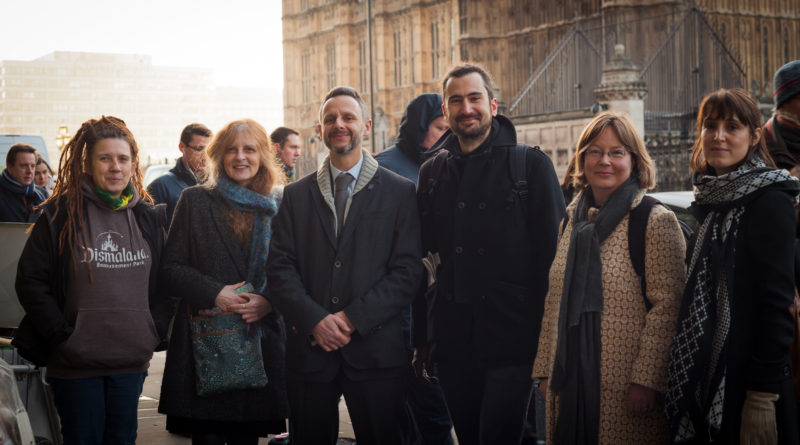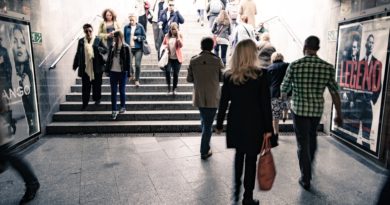the3million: one year in action
Five hundred people will participate in a mass lobby action on Wednesday 13 September in London. They will ask members of parliament that their rights, acquired as EU citizens, are not taken away with Brexit. Another 1,000 people, mostly British residents in EU countries, will join the protest online. Based on proposals on the Brexit table, the 3 million EU nationals in the UK and the 1.2 million British in the rest of the EU will see their rights curtailed in the future. This was not on the agenda of the referendum last year, when the UK voted to leave the European Union. At that time, the3million and British in Europe, the two groups organising the action, did not even exist. As hundreds of people prepare to descend on Westminster, Nicolas Hatton, co-chair of the3million, looks back at the past 14 months and how all this situation came about.
How did the3million group start?
The3million really started on 24 June 2016. I went to bed on referendum night thinking that the UK would stay in the European Union. When I woke up and saw the news the next day, it was a shock. It felt like living in a nightmare and I needed to do something. As I am an elected member of the French community abroad, I thought to organise a meeting for the French in Bristol [where he lives] to discuss what this meant for us and what to do about it. But it was not just us, it was also people coming from the EU27, we were all on the same boat. So the meeting was open and people from other European countries attended. On that occasion, an immigration lawyer raised the alarm on the consequences of the vote for us. Afterwards, participants insisted we had to do something and Anne-Laure Donskoy, co-chair, pushed to meet again the following week. We ended up being 12 people in a pub asking ourselves what to do. This was the start of the3million. We then created a Facebook group, the “Forum for EU citizens”, which quickly became the largest group of EU citizens on Facebook.
What made the difference compared to other groups emerging at that time?
I am a marketeer by profession, so we immediately looked at our brand and I think we got the terminology right. We started to use use the expression ‘EU citizens’. EU migrants, EU nationals, Europeans… none was satisfying. If you talk about citizenship, de facto you have rights where you are, and responsibilities too. The term is more used now than then, so we won this battle. Also, we wanted to have an impact being active in the real world, not just chat in social media. We have never done petitions, for example, and we haven’t done marches, because they are quite ineffective. I marched against the Iraq war, but the government decided to go ahead anyway. We wanted to lobby, because this means you are in the same room of decision-makers. This was our strategy from the beginning, but I had no idea how to do that. The whole thing was new.
So how did you begin?
In October last year I was made redundant so I started to dedicate 100% of my time to the3million. This made a difference. We started to make connections in the real world. The first was with British Future, a think tank that led an enquiry on the future status of EU citizens in the UK. They tried to dissociate people’ rights from the result of the referendum. Then we connected with New Europeans, a group working on free movement. They have been around for a while and helped us understand how Westminster works. We were also lucky to have one of our members at Unison in London, a trade union that made EU citizens’ rights a priority. By then, we had gained a lot of media exposure.
What happened next?
An article in the Guardian last November suddenly brought thousands new members to the Facebook group. We then organised the first mass lobby action, on the same day of the initiative “One day without us.” This put citizens’ rights on the map for members of parliament. After that, we were invited to the hearing of the select committee on Brexit and we linked with British in Europe, who were there too. There was a need to meet EU negotiators, so we set up a group within the3million tasked to lobby the EU. They met Michel Barnier, the EU chief Brexit negotiator, and his team in Brussels, the day before Article 50 was triggered. In comparison, we haven’t had the chance yet to meet the UK Brexit Secretary, David Davis. Nor have British in Europe. Since the triggering of Article 50, we have set up a legal team focusing on policy. We work with British in Europe almost as one team. This is a very close and important partnership.
What is the situation now?
The result of the election gave us a lot of hope because lobbying parliament becames more important. But after three rounds of Brexit negotiations, we are not satisfied of where things are going. We reject the “settled status” proposed by the UK government for EU nationals in the country. No deal can diminish our rights: it is unfair and it creates a lot of personal difficulties.
How many people are part of the3million?
There are 35,000 people in the Facebook group, some 100 volunteers, of which 40 really active. Volunteers have to agree with the line that we are not an anti-Brexit group. Of course without Brexit we wouldn’t have had all these problems, but our focus in on plan B, which is to get a good deal on citizens’ rights. A lot of people have problems with this approach.
How are you funded?
We crowdfunded 37,000 GBP that we use for the trips to London and Brussels. We are volunteers and no one gets a salary from this work. But no one can afford to do this without a job or on top of everything else. There has been a huge price to pay for our families in this regard. We now want to create a charity so this work can be sustained in the long term, at least up until Brexit. In 2018, we aim to almost replicate the Facebook group in the real world, with physical members.
One year later, what has been your biggest success?
Citizens’ rights are the number one issue in Brexit negotiations. It is a condition that will determine whether talks will move to the next step, the discussion of a trade deal. This was achieved in cooperation with British in Europe. People challenge us on this claim, but we could be in a very different place. I am also proud that no one left the3million: everyone with us from the start is still with us now, despite all the discussions. And we are now invited by UK ministers, EU negotiators, leaders of parliamentary groups to discuss the issue, we are an established stakeholder in the negotiations.
The biggest failure?
Because we are so busy campaigning, we haven’t managed to structure and incorporate yet, although this will help seek funding, grow the organisation and have a bigger impact. That will hopefully happen soon.
The most difficult moment?
It is now. The mass lobby on Wednesday will be followed by a rally at Trafalgar Square. When you organise big events like this, you never know if people will turn up.
Did you expect to be in this situation 14 months after the EU referendum?
Yes, I did. The issue is political, so we have to go through the negotiation process, up to March 2019.
What are the biggest obstacles to an agreement?
First, on the UK side there is a policy to restrict the right of any non-British national living in Britain. As Europeans, we were protected by EU Treaties but this will be over soon. The UK solution is to keep EU citizens in the country with fewer rights and this is problematic. Family reunifications are a big issue, for example. Second, at the moment we can live here without any document and not having to claim our right to stay. This will change, but there is little confidence that the Home Office will be able to drive the transition efficiently. We saw the 100 expulsion letters sent by mistake to EU citizens. It was very distressing and showed there is a real problem with the Home Office. Whether it is incompetence or hostility, you don’t want them to be in charge of your life, so the final deal should be supervised by a joint EU-UK institution. Finally, the UK came up with the proposed “settled status” which is presented as a fait accompli, although it is still subject to negotiations: it doesn’t have to be this way.
What is the biggest change you have seen in the past year?
The increase of hate crime and the change in attitude towards EU citizens, especially Polish and Eastern Europeans. This has probably calmed down now, but the result is that people are leaving. The idea of a country of freedom, democracy, where it is easy to find a job and integrate has been dented. Many people say they no longer recognise the country they knew and loved before the referendum. Many think of plan B, moving away. There has been a psychological impact that is changing people’s lives, but we have to wait and see if these feelings remain. The real impact will depend on the negotiations.
Are you confident there will be a good agreement?
I don’t know. The position of the UK is far from what would be a good agreement. We’ll push for it, but it is hard to see the outcome.
What does this say about European citizenship?
Somehow, through this situation we got together as EU citizens like we never did before. In England this created more solidarity among EU citizens, and possibly with migrants. In Europe it will certainly generate more conversations on EU citizenship. As we know it now, citizenship is still a national attribute and the EU is a union of countries. The debate is now moving, although we are far from leaving behind the 18th century notion of the national state.
What is the future of the3million?
We will continue working on political advocacy, set up as a charity and expand the outreach. We do not want to be London-centric, although one million EU citizens live in London. Once the decision-making process will be completed, it’s likely solutions will not work for everyone. There will be vulnerable people and we will assist them so that everyone will be able to stay. A lot of us will probably become British citizens in the coming years. A lot are integrated and part of the British society, so it is likely divisions will heal but this will really depend on the outcomes of the Brexit negotiations and the new relationship established between the UK and the EU.
Claudia Delpero © all rights reserved.
Photo: the3million initial core group, with Nicolas Hatton third from left. Courtesy the3million.





